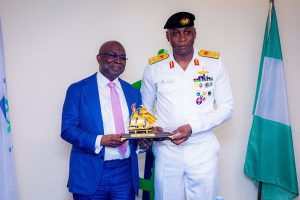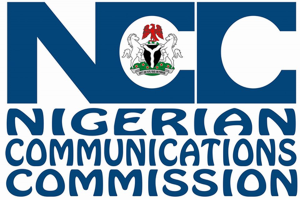…How They Earned Their Places in Tinubu’s Renewed Hope Train
Introduction
Since his inauguration as Nigeria’s President on May 29, 2023, Bola Ahmed Tinubu has been busy doing what is expected of him – performing his constitutional duty of forming and running a government. That duty goes beyond just constituting his cabinet, but extends all the way to effecting changes in the leadership of federal government departments and agencies.
Among the agencies that were affected by leadership changes in the early days of the Tinubu administration were the Federal Inland Revenue Service (FIRS), the Central Bank of Nigeria (CBN), Nigerian Communications Commission (NCC), whose Chief Executive Officers were sent on premature terminal leave and suspended, respectively, and replaced. Since then, so many boards and management of federal government agencies have been changed – some individually, others in groups; some partially, others wholly, some agency-wide, others ministry-wide or sector-wide.
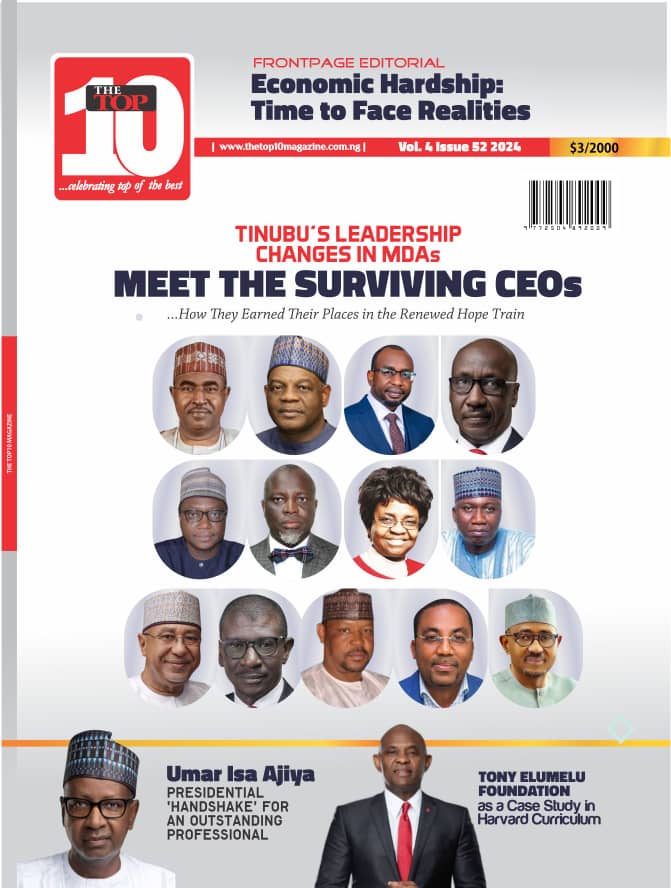
In most cases the statement, usually by the Presidential media aide, Ajuri Ngelale, or the letter to the Senate announcing the new appointments or requesting for confirmation of nominations, respectively, do not state the reasons for the change of guards. This leaves ample rooms for speculations as to why some incumbents are replaced and why some individuals are brought on board.
Also, in most cases the positions of Chief Executive Officers of the agencies, established by the constitution or by other statutes, are tenured. But it is observed that the leadership changes in most of the cases did not wait for the incumbents to serve out their statutory terms. However, because the constitution or the laws establishing the agencies vest the power to appoint and remove their boards and management on the president, nobody, including those whose tenures are truncated, bothers to raise any issues officially about the president’s actions.
We, too, at The Top10 magazine, initially considered the leadership changes by the President as normal and raised no issues. We even feared the changes will be so sweeping that no incumbent Chief Executive would be spared. But that was before we stumbled on an Executive Director of one of the blue chip agencies who was reappointed based, from our findings, on his professional standing, experience and track record of performance. That discovery aroused our curiosity.
For many years, this magazine has been tracking Tinubu’s record of appointments right from his days as Governor of Lagos state and has come to establish beyond reasonable doubt that he is habitually inclined towards making appointments or recommendations based on merit except in some occasions. We subjected our findings to the test after the president named his cabinet in August last year. In spite of political considerations and the constitutional requirement to mandatorily pick his ministers to reflect the federal character, we found that so many ministers were appointed and deployed to the ministries based on merit. We chronicled this finding in the profiles of 10 of them in the Top10 magazine’s lead cover story last year titled “Round Holes in Round Pegs in Tinubu’s government”.
So, out of curiosity once again, we dug into the details of the leadership changes made by the President in the federal government agencies so far to see if they fit into his character. In particular, we sought to know how many Chief Executive Officers of the agencies who had been appointed by his predecessor were reappointed or retained and why. Not surprisingly, we found more than a dozen of them who were reappointed or retained as Chief Executive Officers, with many based on their professionalism and record of performance. While the President has officially announced the reappointment of many of them, he has allowed a few of them, we believe, to simply continue from where he met them.
We researched into their records and can confirm that many of them really earned their reappointment or retention. Our findings are what we serve you as the lead cover story in this edition. Of the 14 cases featured, the one that most unarguably typifies the role of merit more in the President’s decision is that of Dr. Vincent Isegbe, the Director-General of the National Agricultural Quarantine Service (NAQS). Appointed as D-G by former President Muhammadu Buhari, his tenure expired in December last year and, as directed, he handed over to the most senior director in the agency. However, before his substantive successor was to be appointed, a report was released by the Presidential Enabling Business Environment Council (PEBEC) which ranked NAQS under the leadership Dr. Isegbe in the top three agencies of the Federal Government of Nigeria in the efficiency and transparency index. An impressed President Tinubu did not hesitate to return Dr. Isegbe to NAQS to continue with his good work.
The stories of the 13 others may not be as sensational or dramatic, but they nonetheless represent very good case studies of a president who, in many occasions puts merit above other considerations in making his appointments or assigning responsibilities.

KASHIFU INUWA ABDULLAHI, (DG/CEO,NITDA)
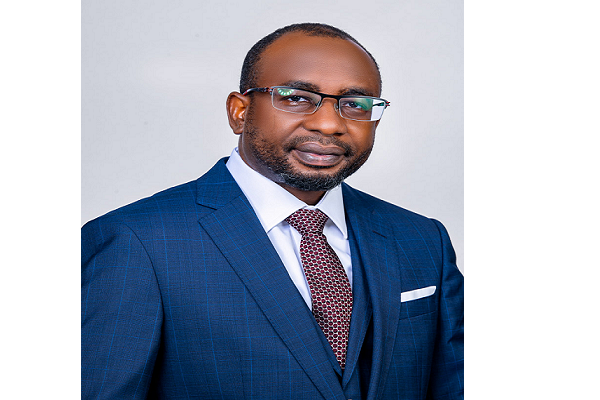
Kashifu Inuwa Abdullahi was appointed Director-General/Chief Executive Officer (CEO) of the National Information Technology Development Agency (NITDA) in August 2019. He took over the role from Prof. Isa Ali Ibrahim Pantami who had just been appointed as Minister of Communication and Digital Economy by President Muhammadu Buhari.
Abdullahi’s renewable four-year tenure was to elapse by August 2023, the period coinciding with the active formation of the new government and other leadership changes at the Federal level by Buhari’s successor, President Bola Ahmed Tinubu. But before President Buhari left office in May 2023, he had given approval for the reappointment of Abdullahi as the DG/CEO of NITDA for another term, but the new term was not effective before Tinubu took over. This left the new President with ample opportunity or justification to put Buhari’s approval aside and appoint another person in Abdullahi’s stead. But Tinubu went ahead to confirm Abdullahi’s reappointment for another four years. This is an affirmation of Buhari’s judgment and Tinubu’s confidence in Abdullahi’s ability and capacity to continue to steer the affairs of NITDA in the desired direction into the future.
Abdullahi is a transformational expert with key competencies across policy formulation, administration, growth management, talent development, solutions architecture, resource mobilisation and strategy implementation. He is a thoroughbred IT professional, with an impressive resume in public and private sector IT development, policy formulation, and IT governance.
Since assuming office as the Director General of NITDA in 2019 at the youthful age of 39, Abdullahi has proved that Nigeria can be Africa’s largest digital economy. He has been steadily building upon the foundation laid by the previous occupants of that office, driving the agency to fulfill its core mandate in line with the National Digital Economy Policy and Strategy (NDEPS) of the Federal Government.
To put Nigeria on a path to effectively operate a digital economy, NITDA, under the stewardship of Abdullahi mapped out a Strategic Roadmap and Action Plan (SRAP 2021-2024), identified by the Agency as the fulcrum of the digital economy development.
In his numerous public presentations, the NITDA DG/CEO has spoken extensively about the pillars of SRAP, namely Developmental Regulation; Digital Literacy and Skills; Digital Transformation; Digital Innovation & Entrepreneurship; Cybersecurity; Emerging Technologies; and Promotion of Indigenous Content.
Abdullahi has achieved significant progress since taking over the mantle of leadership at NITDA. His dedication and passion for the vision of an ICT-enhanced economy has contributed towards making NITDA the most significant parastatal in the Ministry of Communications and Digital Economy through the implementation of more than 300 infrastructure projects in the ICT industry in just the first year under his leadership.
He also launched the Nigerian National Public Key Infrastructure, the Digital State Initiative and the National Adopted School for Smart Education (NASSE), among other initiatives that have catered for the development of the country’s youthful population’s capacity.
Based on his belief that a country must operate in a setting where the youth have a level of competence comparable to that of their counterparts anywhere in the globe, NITDA, under Abdullahi’s leadership, introduced a scholarship programme which has prepared more than 2,000 Nigerians for Masters and Doctoral programmes around the globe. The majority of the recipients frequently return home after completing their funded studies.
In addition to the above contributions, NITDA has constantly provided the Nigerian people and NGOs with digital devices and equipment, as well as outfitted and supported digital economy centres located throughout the nation’s 36 states and the Federal Capital Territory (FCT). These have given birth to groundbreaking initiatives such as the establishment of the nation’s first National Centre for Artificial Intelligence and Robotics, which will oversee the nation’s ability to fully utilize the enormous potentials of the AI industry. A smooth implementation of the national policy on virtual engagement in the public service enabled the Federal Government system to function without major disruptions during the COVID-19 pandemic lock down of the 2020 -2021.
Across the nation, more than 940 digital capacity centres, IT hubs, innovation, and incubation parks, and IT community training centres have been constructed. In addition, there are also initiatives like Start-Up Friday, Start-up Clinic, FutureHack, the NITDA Graduate Internship Programme, and training for craftsmen. Abdullahi has led NITDA to carry out several projects that saved the country billions of Naira. His contributions to the emerging digital economy revolution in Nigeria has not gone unnoticed as evidenced by NITDA becoming the sole government organization to win the coveted National Productivity Order of Merit Award on May 12, 2022.
Abdullahi’s goal is to make NITDA one of the leading IT regulatory bodies worldwide. He hopes to make NITDA the leading knowledge-based, well-respected, laser-focused, and success-driven government agency in Nigeria.
Abdullahi graduated with a bachelor’s degree in computer science from Abubakar Tafawa Balewa University Bauchi. He holds various executive certificates from top-notch universities such as Harvard University, University of Cambridge, London Business School and Oxford University, UK. Abdullahi is also an alumnus of the prestigious IMD Business School, Switzerland, and a trained strategist from the world-famous Massachusetts Institute of Technology (MIT). He holds many professional certifications in telecommunications, service management, networking, and solution design.
Abdullahi who is the first Cisco Certified Internetwork Expert (CCIE) in Nigeria’s public sector has earned about 20 years of experience in the public and private IT space.
He started his professional career at Galaxy Backbone Ltd where he served as a network engineer and senior network and lead solution architect. In 2014, he joined the Central Bank of Nigeria (CBN) as a Technology Architect where he was part of the team that developed the CBN Technology Architecture Repository (TAR) and also executed software license rationalization that increased cost savings for the bank in licensing annual subscription.
He joined NITDA in 2017 as the Technical Assistant to the then
Director General, Professor Pantami, and has significantly contributed to the Agency’s growth and development since then.
MR. MOHAMMED BELLO-KOKO (MD/CEO, NPA)
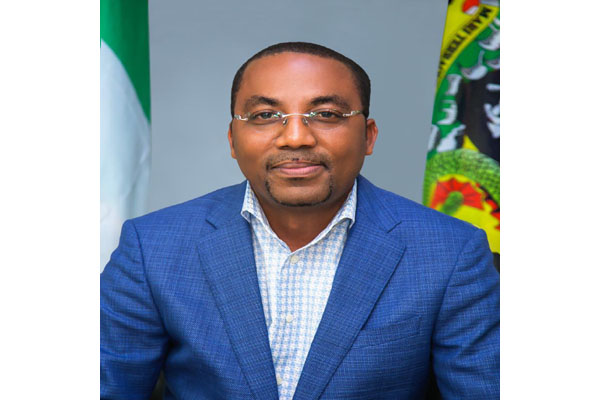
Mohammed Bello-Koko was one of the two incumbent Chief Executive Officers of the four agencies under the new Ministry of Marine and Blue Economy who were reappointed by President Bola Ahmed Tinubu in 2023.
Bello-Koko had spent just over a year in that position at the time of his reappointment, having been confirmed as substantive Managing Director/Chief Executive Officer (CEO) of the Nigerian Ports Authority (NPA) by former President Muhammadu Buhari in February 2022. Until that confirmation, he was the Executive Director, Finance and Administation, and Acting MD/CEO of the Authority.
His reappointment was not merely based on the need to allow him to continue and complete his term. President Tinubu had replaced many CEOs of Federal Government agencies in similar positions and circumstances. Bello-Koko’s reappointment was, rather, in line with the new President’s well-known favourable disposition towards professionalism and merit in making appointments.
Within the short time Bello-Koko acted as NPA MD/CEO, he had proved himself to be the perfect fit for the office, making the task of his reappointment easier for the President. He has embarked on audacious projects and recorded great accomplishments since assuming the driver’s seat at the Authority.
Bello-Koko came to NPA as Executive Director in charge of Finance and Administration from the private sector, where he had been a consummate banker. He was appointed as NPA Acting MD/CEO in 2021 and confirmed as the substantive helmsman in 2022.
Since then he has hit the ground running. He galvanized his staff members to key into his vision of enlarging the coast and expanding the frontiers of the Authority in terms of executing projects that would lead to increased revenues and remittances to the Consolidated Revenue Fund of the Federation. His vision for new port development gained instant and wide support as soon as he unveiled it.
He provided necessary technical guidance for the Outline Business Case, (OBC), Full Business Case (FBC) and eventual approval for the concession of the following new ports: Badagry Deep Seaport, Ondo Deep Seaport, Snake Island Port, and Burutu Port. The immediate objective of these ports, when operational, is to decongest the traffic to Apapa Port. They would open up the various locations where they are sited and create new vibrant commercial and socio-economic hubs in aid of societal growth and development.
Bello-Koko matched the idea of new ports with action by fast-tracking the construction of deep seaports and port capacity enhancement and promoting national preparedness for the African Continental Free Trade Area (AfCFTA). He bolstered this by enlisting Nigeria in the league of countries with deep seaports by providing uncommon support and fast tracking the approval processes that culminated in the speedy designation of Lekki Deep Seaport as a Customs Wharf and subsequent commencement of operations in record time; inauguration of actual work towards the 25-year Port Masterplan; and International Organization for Standardization (ISO) Certification of Onne and Calabar Ports with all other ports at advanced stages of certification. He also secured approval for the commencement of construction of Badagry Deep Seaport and provision of technical guidance for the construction of more Deep Seaports; and the full automation of Lekki Deep Seaport, which positions Nigeria to optimize opportunities inherent in AfCFTA and win back transit cargo hitherto lost to Nigeria’s maritime neighbours.
Under Bello-Koko’s leadership, Nigerian ports have indeed witnessed improved navigational aids. For instance, the Authority provided and installed navigational aid and buoys in Warri and Calabar Pilotage Districts for proper channel marking and route mapping. It acquired Marine Crafts (Pilot Cutters and Patrol Boats) to eliminate delays associated with the berthing and sailing of vessels and to improve efficiency at the ports. Other developments at the ports included dry-docking of various marine crafts to increase the fleet of marine crafts available for vessel support operations; enhancement of port security through procurement and deployment of security patrol boats, (SPBs) to all pilotage districts to address incessant attacks of vessels along the channels and at ports’ waterfronts; and establishment of a robust partnership with the EU-funded West and Central Africa Ports Security, (WeCAPS) towards risk prevention, vulnerability assessment of port infrastructure, and skills acquisition for port personnel to strengthen the security and safety of Nigerian ports.
The Authority, led by Bello-Koko, has also ensured the standardization of operational procedures for different activities such as barging, private jetties, pilotage, vessel berthing/sailing, etc.; a significant reduction in the traffic gridlock along the main port corridor and on the internal access roads through enforcement; proper batching; continuous access control mechanisms; and the movement of cargo via barge operations. In addition to the above, the Authority under Bello-Koko’s leadership has also provided traffic surveillance motor cycles deployed in the ports for effective monitoring of truck e-call-up operations at Apapa, TCIPC, and Ijora axis to ease the free flow of traffic, as well as establishing a standing partnership with the Police High Command, resulting in the reduction of illegal checkpoints along the port corridor to stem abuse and extortion as well as make traffic management more effective.
In acknowledgment of his repositioning of NPA for improved trade facilitation, revenue generation and unprecedented remittances to the Consolidated Revenue Fund (CRF), the Federal Government conferred on Bello-Koko the National Productivity Order of Merit (NPOM) Award in 2023. The NPOM Award was instituted by the Federal Government to recognise and honour productive individuals and organisations in Nigeria in the year of the award for achievements made in the preceding years. An evaluation of his reforms by NPOM organizers, Bureau of Public Service Reforms (BPSR), classified NPA as a level 5 “Platinum Level” Organisation. The BPSR Self-Assessment Tool (SAT) deployed in NPA for the independent assessment, validated assessment and in-depth analysis of processes and practices of the agency returned the verdict of “exceptional performance with performance level of 91.25 percent.”
Bello-Koko who was born on March 25, 1969, attended Usmanu Danfodio University, Sokoto for his bachelor of science (B.Sc.) degree in Management Studies and Master’s degree in Business Administration (MBA) in 1992 and 1995, respectively. He proceeded to Harvard Kennedy School, USA, where he bagged an Executive Certificate in Public Leadership.
Bello-Koko started his career with FSB International Bank Plc from the year 1996 to 2004 where he functioned across several strategic portfolios including Banking operations, Credit-Risk Management, Treasury Operations, Retail banking and Corporate Marketing that found him in charge of Energy sector and Public Sector. He was, thus, responsible for managing the accounts of several multinational oil and Gas companies and Public sector relationships.
He moved to Zenith International Bank Plc in 2005 where he grew at various times to be Branch Head, Zonal Head Public Sector and also Large Corporates from where his exceptional contribution to the bank’s globally referenced profitability and balance sheet in the period 2005 to 2015 earned him numerous awards in the bank and a spot in the bank’s Executive Management Team as Deputy General Manager and Zonal Head.
In 2016, Mohammed Bello-Koko was appointed by President Muhammadu Buhari as Executive Director, Finance and Administration, of NPA, a role he held with distinction till May 2021, when he was appointed Acting Managing Director.
Bello Koko who is a fellow of both the Association of National Accountants of Nigeria (ANAN) and the Institute of Strategic Management (ISMN), is also a member of the Nigerian Institute of Management (NIM) and has attended several domestic and international trainings.
MELE KYARI (GMD, NNPC)
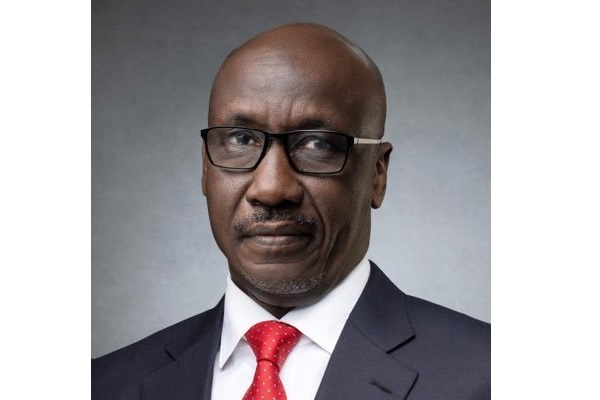
The retention of Mele Kolo Kyari as the Group Managing Director (GMD) of Nigerian National Petroleum Company Limited (NNPCL) by President Bola Ahmed Tinubu did not come to many as a surprise. In the last 33 years, Kyari has traversed the entire value chain of the Petroleum Industry, rising through the varous management cadres and subsidiaries of the company. President Tinubu’s decision to retain Kyari as NNPCL GMD is, therefore, another evidence of his preference for merit, competence and professionalism, above political and other considerations, in making his appointments.
Kyari’s reappointment was contained in a statement by Ajuri Ngalele, Presidential Media Aide, in which he unveiled the new management and board of the government company, effective December 1, 2023. The presidential spokesman said “President Tinubu anticipates the fullest measure of compliance with the performance-driven and results-oriented mandate of his Renewed Hope administration in the implementation of energy policy that will monetize all available oil and gas resources of today while paving the way for the total exploitation of new and cleaner energy sources of tomorrow by this distinguished team.”
Kyari will, no doubt, feel comfortably at home with the presidential expectation. In the four years preceding his reappointment NNPCL, under his leadership, has been implementing various initiatives aimed at boosting crude oil production, guarantee energy security, reduce carbon emission, and get the refineries back on stream, among others.
Kyari became the last GMD of the Nigerian National Petroleum Corporation (NNPC) in July 2019 and transited to being the first GMD of the new, commercially-oriented national oil company called Nigerian National Petroleum Company Limited (NNPCL). The transition followed the enactment of the Petroleum Industry Act (PIA) 2021 which transformed NNPC into NNPCL, a company that is now governed by the Companies & Allied Matters Act (CAMA) provisions. Kyari seized the opportunity of that transformation to grow NNPC Limited’s profitability significantly, from a loss position of N803bn in 2018 to N1.7bn in 2019, and the eventual declaration of a net profit in 2020. By fiscal 2021, the corporation’s profit grew to N674bn. The NNPC Limited has become so profitable as a commercial entity that it is currently targeting a profit increase of N2trn when the 2022 Audited Financial Statements (AFS) are released. The company is now involved in the entire value-chain of the entire oil and gas business and controls over 30 per cent of the nation’s petroleum retail market.
In September 2023, NNPCL completed the acquisition of OVH Energy, adding to its assets the reception jetty (ASPM) with 240,000MT monthly capacity, eight LPG Plants, three Lubes Blending Plants, three Aviation Depots, and 12 warehouses. That deal has boosted the profitability of one of its subsidiaries, NNPC Retail, to N18.4bn in the first three months of 2023. The acquisition, under the leadership of Kyari, shows his vision to make NNPC a force in the global energy market.
Also, NNPCL has added Oando’s 380 fuel stations to its existing stations making it the largest fuel retailer and a leading energy company in Africa.
To address the major challenges of crude oil theft and pipeline vandalism to the company’s business, Kyari recently led NNPCL to collaborate with the nation’s security services as well as third-party security contractors. The collaborations have been yielding results, mostly in the area of increased crude oil production. With oil theft and pipeline vandalism overwhelming Nigeria’s oil business in recent past, NNPC Limited had adopted the Saudi Aramco’s model of using video surveillance to monitor its pipelines carrying crude oil from wells to flow stations in the Niger Delta.
The company, in collaboration with security agencies, have also set up a control centre to provide surveillance of all the country’s oil and gas assets in the Niger Delta. The surveillance system is known as the Central Coordination, Data Integration and Activation Control Room. Just like the Saudi Aramco, the NNPCL Data Control Centre uses video visibility to monitor the country’s Niger Delta pipeline networks, where more than 90 percent of the country’s crude is explored. So far, over 22 million litres of stolen crude have been recovered through intelligence provided by the Data Centre. Similarly, over 22 million litres of Diesel, 0.15 million litres of Premium Motor Spirit, and 0.76 million litres of kerosene have also been recovered from criminals.
Beyond arresting crude oil thieves and shutting down illegal refineries, the NNPC Limited under the leadership of Kyari is expanding the frontiers for crude oil production. NNPC Limited is investing in several gas and power projects across the country, aimed at supporting the Federal Government’s power generation and industrialisation aspirations. The company, spearheaded by Kyari has entered into a turnkey Engineering, Procurement and Construction (EPC) contract with China Machinery Engineering Corporation (CMEC) to construct the Gwagwalada Independent Power Plant project which was flagged-off in August 2023 by President Bola Tinubu. Described as a game-changer in Nigeria’s power sector, it is a 1,350MW Combined Cycle Power Plant with auxiliaries and Balance of Plant located on 547 hectares of land already acquired at Gwagwalada, in the Federal Capital Territory (FCT), Abuja. The project is expected to generate an income of between $700m and $800m annually within the first ten years of operations.
The company is working assiduously to revamp local refining of petroleum products and collaborating with indigenous refiners to ensure Nigeria becomes a net exporter of petroleum products. Specifically, Kyari has said that payment of subsidy was responsible for inactive refinery activities in Nigeria over the years saying that the removal of subsidy is already attracting a lot of private sector investments.
The GMD told the National Assembly leadership during a visit last year: “I can confirm to you that by the end of December latest, we will start the Port Harcourt refinery; early in the first quarter of 2024, we will start the Warri refinery and by the end of 2024, Kaduna refinery will come into operation.
“This is the commitment we are giving today and you can hold us accountable on this; in 2024, many of the initiatives including the rehabilitation of our refineries and also the efforts of small scale refiners, and the upcoming startup of the Dangote refinery, will make Nigeria a net exporter of petroleum products in 2024. We will no longer be talking about fuel importation by the end 2024, I am very optimistic that this will crystallise.”
According to projections released by Kyari, by the end of 2023, the expected government revenue from the company is N4.5trn. This means that NNPCL is returning value to shareholders in line with the Petroleum Industry Act.
Kyari who hails from Borno state, is the 19th GMD of the national oil company. A holder of a Bachelor of Science (B.Sc) degree in Geology and Earth Science from the University of Maiduguri in 1987, Kyari did his National Youth Service Corp (NYSC) with the Directorate of Foods, Roads and Rural Infrastructure (DFRRI) between 1987 and 1988.
He worked with the Nigerian Geological Survey Agency between 1988 and 1991, before joining the NNPC subsidiary, Integrated Data Services Limited (IDSL), where he worked as a Seismic Data Processing Geophysicist in the Data Processing Department. From there Kyari moved to the National Petroleum Investments Management Services (NAPIMS), another subsidiary of NNPC, as Exploration Geophysicist Production Sharing Contract (PSC); and Abuja Operations Manager. He was posted to mainstream NNPC in 2006 as Supervisor PSC, Crude Oil Marketing Department (COMD) and, thereafter, climbed the managerial ladder to the position of NNPC Group General Manager, Crude Oil Marketing Division (COMD) in 2015 and doubled as Nigeria’s National Representative to the Organization of the Petroleum Exporting Countries (OPEC) from May 13, 2018.
It was while serving in those dual capacities that former President Muhammadu Buhari appointed Kyari as the Group Managing Director/Chief Executive Officer (CEO) in 2019.
PROF MOJI ADEYEYE (DG, NAFDAC)
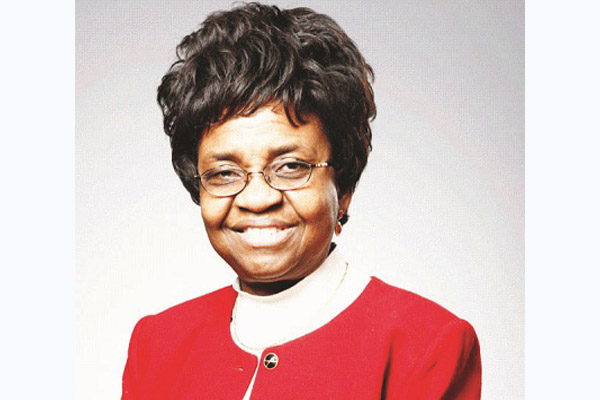
The decision to reappoint Professor Moji Adeyeye as the Director General and Chief Executive Officer of National Agency for Food and Drug Administation and Control (NAFDAC) must have been a fairly easy one for President Bola Ahmed Tinubu. Not only did the Professor Emeritus of Pharmaceutics and Drug Product Evaluation bring one of the tallest professional credentials and experience to NAFDAC, she used same to turn the fortunes of the agency around during the almost six years she had spent as its Chief Executive Officer before Tinubu became President.
Former President Muhammadu Buhari who appointed Prof Adeyeye into that office in 2017, acknowledged her sterling contributions when he reappoined her for another term of five years effective December 2022. Similar favourable assessment must have informed Tinubu’s decision to retain her.
Adeyeye’s reappointment was contained in a statement by the Presidential spokesman, Ajuri Ngelale in which he announced the new Board Chairpersons and Chief Executive Officers of agencies under the Federal Ministry of Health and Social Welfare.
Ngelale said the appointments reflected Tunubu’s determination to bring world-class standards to Nigerian public health administration and to manifest his commitment to deliver affordable and quality care to all Nigerians under governance and regulatory frameworks commensurate with international best practice.
That is what Prof. Adeyeye has been doing since becoming NAFDAC Chief Executive Officer in 2017. She introduced strong governance structure, regulatory system strengthening, and strengthening of the local pharmaceutical companies through international best practices with emphasis on local manufacturing. She has brought NAFDAC from insolvency to solvency and refocused it to be Standard Operating Procedure-driven organization that has embraced international standards and best practices.
She changed the culture of NAFDAC to Customer-focused and Agency-minded establishment in order to safeguard the health of the nation. All these have resulted in the attainment of ISO 9001-2015 in 2019, yearly re-certification, and WHO Maturity Level 3 (ISO 9004) in 2022, a recognition as a well-functioning agency. Resulting from these is the gradual strengthening of the pharmaceutical industry as exemplified in the recent WHO prequalification of a pediatric product of a local manufacturer, the first in West and Central Africa. The paradigm shift for access to medicines included the introduction of innovative reforms such as the 5+5 policy, the expansion of NAFDAC’s ceiling list to 34 products (aimed at increasing access to quality medicine through local manufacturing), new policy on establishment of Pharmaceutical Plants in Nigeria, the centralized GMP inspection for Pharma plants and Good Distribution Practice (GDP) inspection.
The current transformative leadership of NAFDAC is manifesting in the strengthening of grassroot pharmacovigilance or post-marketing safety monitoring, expansion of risk-based post marketing surveillance, introduction of Dossier Management System (an online solution that streamlines the dossier), leading in Africa the development and use of Traceability Information System – a GS1-driven technology – to give COVID-19 vaccines and ATM commodities’ supply chain visibility and mitigate substandard and falsified medicines, as part of restructuring toward ML4 and WLA status.
Prof Adeyeye is leading the NAFDAC in strengthening of the Food industry through emphasis on Food Safety, evidence-based Chemicals and Pesticides Management. She inaugurated Nigerian Herbal Medicine Product Committee (HMPC) as a means of fostering research involving herbal practitioners and academic researchers while the intellectual property is protected. The ultimate goal is to turn complementary alternative medicines into a research-driven, regulation controlled commercially viable commodities.
Outside NAFDAC, Professor Adeyeye has contributed and is still contributing her professional skills towards the advancement of society. She is the past Chair of the Steering Committee of the African Medicines Regulatory Harmonization (AMRH) and the WHO-based Global Pediatric Regulatory Network. She represents NAFDAC on the International Coalition of Medicines Regulatory Authorities (ICMRA) and has been invited to be on the WHO Regional Expert Advisory Committee on Traditional Medicine for COVID-19.
She is a Fellow of Nigeria Academy of Science, Nigeria Academy of Pharmacy, and Academic Research Fellow of American Association of Colleges of Pharmacy (AACP). She is the First African Woman Fellow, American Association of Pharmaceutical Scientists (AAPS) a society where only three percent of academia receives such recognition internationally.
Adeyeye is Professor Emeritus of Pharmaceutics and Drug Product Evaluation at the College of Pharmacy, Roosevelt University in Schaumburg, Illinois, USA. She was the founding Chair of Biopharmaceutical Sciences at the same University in Illinois. She was Professor of Pharmaceutics and Manufacturing for 21 years at Duquesne University in Pittsburgh, PA, USA. She is a Senior Fulbright Scholar and Specialist. She earned her B.Sc from the University of Nigeria, Nsukka, Nigeria and M.Sc and PhD from the University of Georgia, Athens, GA. H
ENGR. FAROUK AHMED (CEO, NMDPRA)
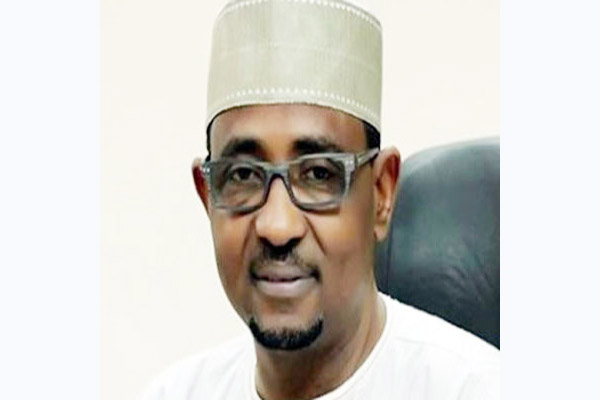
Engr. Farouk Ahmed Chief Executive Officer of The Nigerian Midstream and Downstream Petroleum Regulatory Authority (NMDPRA) is one of the best hands in the Nigerian oil and gas industry in terms of training, expertise and experience. He has held top management positions in the industry, both within Nigeria and outside the country.
There was a minor drama to his appointment by former President Muhammadu Buhari in September Ȃ1.The announcement of Ahmed’s appointment was contained in a letter by the President dated September 28, 2021 to the then Senate President, Ahmad Lawan. In the letter, the President said Ahmed’s appointment would replace that of Sarki Auwalu, the incumbent Director of the Department of Petroleum Resources (DPR), whose name had earlier been sent to the Senate for confirmation.
“In accordance with the provision of Section 34(3) of the Petroleum Industry Act (PIA) 2021,” the President wrote, “I hereby forward for confirmation by the Senate the nomination of Engineer Farouk Ahmed as Chief Executive Officer for the Board of the Nigerian Midstream/Downstream Petroleum Regulatory Authority as a replacement of Eng. Sarki Auwalu earlier forwarded.”
Many industry operators hailed the decision on the ground that Ahmed’s appointment amounted to putting a round peg in a round hole. Since assuming the mantle of leadership at NMDPRA, Ahmed has been living up to the expectations of the government and the stakeholders. That is obviously why he was reappointed by President Bola Ahmed Tinubu who mandated him and other members of the Board and Management of the Authority to discharge their duties by upholding the highest standards of transparency, discipline, and patriotism in line with his administration’s drive to enhance the role of the gas sector in achieving robust and inclusive economic growth for Nigeria.
Since becoming the Chief Executive Officer, Ahmed has been leading NMDPRA to fulfill its mandate as the regulator of the midstream and downstream sectors of the Nigerian petroleum industry. In March 2023, NMDPRA unveiled six regulations that would govern the activities of the midstream and downstream sectors of the Nigerian petroleum industry. The six regulations address issues such as petroleum transportation and shipment, assignment or transfer of licenses and permits, gas pricing for domestic demand and delivery, natural gas pipeline tariffs, petroleum measurement and midstream and downstream petroleum operations.
Later in July, the agency announced the introduction of four new additional regulations aimed at addressing environmental and safety concerns in the midstream and downstream petroleum sector. The new regulations include the Midstream and Downstream Petroleum Environmental Regulation 2023, designed to ensure that environmental standards and practices are upheld across midstream and downstream petroleum operations.
Others are the Midstream and Downstream Petroleum Safety Regulation 2023, which prioritizes safety measures and procedures; Midstream and Downstream Decommissioning and Abandonment Regulation 2023, which outlines the requirements and procedures for the decommissioning and abandonment of petroleum facilities; and the Midstream and Downstream Environmental Remediation Fund Regulation 2023, which sets out the establishment and financial contribution of the Fund for operations.
The fund aims to provide resources for the cleanup, rehabilitation or management of negative environmental impact from petroleum operations nationwide. These regulations, according to the agency, will enhance value, create an enabling environment and deepen activities in the midstream and downstream sectors for the benefit of Nigerians.
This was followed up in December by a stakeholders’ forum on regulations in Abuja where it was announced that 16 regulations had been drafted and gazetted and another set of four regulations were waiting to be gazetted. The Authority has advised operators in the industry to adhere strictly to the regulations.
A graduate of Southern Illinois University, Carbondale, USA, Ahmed obtained a Bachelor of Science Degree in Engineering Technology, with cumulative professional and career experience spanning over 34 years in the American technological space and in the Nigerian oil and gas industry.
He commenced his career as a Logic Board Verification Engineer at Apple Computer Incorporated, which was later changed to Apple Incorporated, in Dallas, Texas, USA.
He later returned to Nigeria to participate in the mandatory one-year National Youth Service Corps (NYSC) scheme. Thereafter, he joined the then Nigerian National Petroleum Corporation (NNPC), now Nigerian National Petroleum Company Limited (NNPCL), where he rose through the ranks to hold top management positions in the organization. Some of the positions Ahmed occupied in his over three decades career in the oil and gas industry include: Senior Crude Oil Trader, Duke Oil Incorporated; Manager, Crude Oil Export Programming and Nominations, Shipping and Terminals (Crude Oil Marketing Division-NNPC); Executive Director, Commercial, Petroleum Products Marketing Company (PPMC); Managing Director, NiDAS Marine Limited; Executive Secretary, Petroleum Products Pricing Regulatory Authority (PPPRA); Managing Director, PPMC; and Special Adviser (Downstream) to Group Managing Director (GMD), NNPC.
The NMDPRA boss was a member of the Governing Board of the Nigerian Shippers Council and has also been the MD/CEO, Hauwath Consulting Limited. Ahmed is a Member of the Nigerian Society of Engineers (NSE) as well as a Member of the Institute of Electrical and Electronics Engineers (IEEE-USA). He is also a registered member of the Council for the Regulation of Engineering in Nigeria (COREN).
ARC. SONNY ECHONO (EXECUTIVE SECRETARY, TETFund)
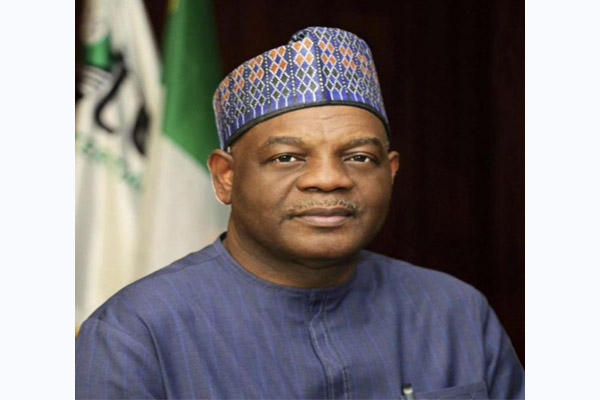
Arc. Sonny Echono is the poster boy for versatility and excellence in Nigeria’s Federal civil service. In the course of his over three decades in the service, he served in very many diversified and unrelated capacities and, each time, he earned accolades for outstanding performance. It was, therefore, not surprising that, immediately after his retirement as Permanent Secretary, Federal Ministry of Education, he was appointed by former President Muhammadu Buhari as Executive Secretary of the Tertiary Education Trust Fund (TETFund) in 2022. And, in line with President Bola Ahmed Tinubu’s character to always appoint the best hands into positions of responsibility, he retained Sonny Echono to continue with his good work at TETFund.
As in his previous assignments, Echono began to distinguish himself quite early at TETFund, a Federal Government education intervention agency for the sponsorship of lecturers for postgraduate studies, funding constructions and refurbishment of educational facilities, promoting creative and innovative approach to learning; provision of higher educational books and funding of libraries, and provision of learning equipment.
In his first year on the saddle, Echono introduced sweeping reforms in various activities of the agency to eliminate corruption, reduce delivery time of projects, prevent cost escalation and improve general efficiency in the discharge of the Fund’s mandate.
Under the new dispensation, all projects to be executed by the Fund are planned, packaged and selected by the beneficiary institutions for review and concurrence of the Fund. No more TETFund or vendor-promoted projects, as the needs of the institutions now prevail. The annual disbursement allocations are now made directly to the beneficiary institutions. The Executive Secretary, at a public ceremony held at the National Universities Commission (NUC) on 9th May 2022, directed that the Vice-Chancellors, Provosts and Rectors are to advertise and procure their projects through open, competitive bidding to achieve value for money.
TETFund, under Echono’s leadership, has formed a partnership with the Brazilian government and Forum for Agricultural Research in Africa (FARA) to achieve the needed transformation in Nigeria’s agricultural sector. The deal was sealed at the first Agricultural Research and Innovation Fellowship for Africa (ARIFA) Symposium held at the Federal University of Viçosa, Brazil, with the theme, ‘Pedagogic Retooling Strategy for Africa’s Agricultural Research and Innovation System: Lessons from Brazil.’
Other areas of intervention by TETFund under Echono are deepening research development and innovation, and provision of funds for capacity building of lecturers to equip them with requisite skills for entrepreneurial and research studies in digital technologies.
The tempo and consistency of Echono’s leadership were acknowledged by the chairman of the TETFund technical advisory group, Charles Aworh, at the public presentation of 10 TETFund-sponsored textbooks in Abuja where he commended the Fund for this laudable feat, stating that the transformation brought on board by the current leadership is result-oriented and will advance the educational curriculum. Praising the Chief Executive for the milestones achieved within just a few months in office, the Minister of Education, Goodluck Nana, in his remarks at the ceremony, said that the scarcity of tertiary textbooks in Nigeria was alarming and the proportion is evident not only in the quality of books but also in the number of books produced locally. He, therefore, commended TETFund for the establishment of the TETFund higher education book development project.
Echono also improved on the welfare of workers. An average TETFund staff today is sufficiently motivated to ply his or her job with contentment and renewed strength. It is, therefore, not surprising that their productivity is rising higher every day.
Echono is a stickler for innovation. In many fora he has emphasized that TETFund under his leadership will continue to deepen and champion a robust innovation and ICT infrastructure across the centres of learning that will transform Nigeria’s educational system and make its graduates global competitors. He believes that research will lead to innovation and commercialization of such patents.
It is in recognition of his contributions and reforms at TETFund in advancing the tertiary education system that President Buhari conferred on Echono the National Honour of Officer of the Order of Niger.
Arc. Sunday Sylva Togo Echono’s journey stands as an inspiration to all aspiring architects, civil servants, and individuals striving for excellence. His dedication to service, continuous learning, and unwavering commitment to progress paint a picture of a visionary leader whose impact will be felt for generations to come.
His educational voyage began at St. Mary’s Primary School in Otukpo, Benue State, and continued at St. Theresa’s and St. Murumba’s College in Jos. His early promise and leadership skills shone, leading him to graduate as the top student of the class of 1973-78 with a Division I in the West African School Certificate (WASC) Examination. An accomplished athlete, he excelled in soccer, basketball, and volleyball.
Despite initial plans for overseas education, Echono’s journey took a different course after the passing of his father. He embraced ‘A’Levels/IJMB at the Murtala College of Arts, Science, and Technology (MUCAST) before enrolling in Ahmadu Bello University, Zaria, to study Architecture. Graduating with a BSc. (2nd Class Upper) in 1983 and an MSc. in 1985, his academic achievements were recognized and celebrated.
Echono’s entry into the Federal Civil Service in 1987 marked the commencement of a distinguished career. At the Federal Ministry of Works and Housing, he exhibited unwavering dedication. His roles ranged from committee secretary to overseeing pivotal projects, and he played a crucial part in pioneering procurement reforms in Nigeria through the Budget Monitoring and Price Intelligence Unit (BMPIU).
Over his 35 years of service, Echono has played a pivotal role in policy formulation and reforms within the Nigerian Civil Service. His ontributions extended across sectors such as housing, procurement, infrastructure, and education.
While his accomplishments within the civil service are monumental, Echono’s leadership reverberates through the architectural community. His journey from Secretary of the Admissions Committee to become the 28th President of the Nigeria Institute of Architects (NIA) showcased his dedication to driving architectural progress.
IS’HAQ OLOYEDE (Registrar/CEO, JAMB)
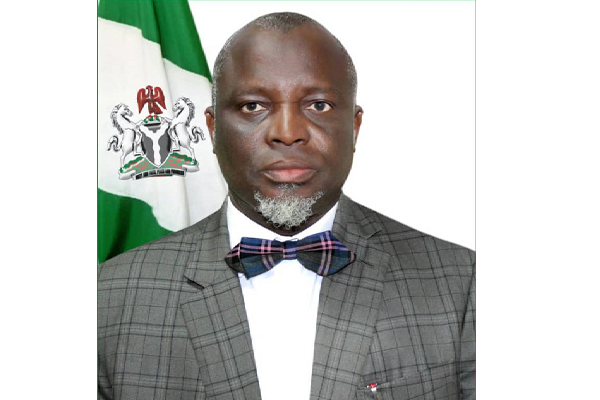
Professor Is’haq Olanrewaju Oloyede, the Registrar and Chief Executive Officer of Joint Admissions and Matriculation Board (JAMB) became famous as a high-performing Vice-Chancellor of University of Ilorin (Unilorin). As the vice-chancellor, Oloyode pursued academic excellence as though his whole life depended on it. Consequently, Unilorin became one of the most sought-after institutions by candidates seeking admission into tertiary institutions in the country. Needless to say Unilorin’s ranking among world universities at the time soared on the wings of the academic excellence Oloyode built.
Many believe that it was Oloyede’s performance at Unilorin that earned him the appointment as Registrar/Chief Executive Officer of JAMB by former President Muhammadu Buhari in 2016. Whether that was the case or not, Oloyede’s performance at JAMB so far has shown that his public rating as an exceptionally high-performing leader is not a fluke. Right from the onset, he left no one in doubt about his mission and vision to set JAMB on a path of honour, dignity, and excellence.
The primary mandate of JAMB is to conduct examinations for admission into Nigerian tertiary educational institutions. For years, since inception in 1978, JAMB’s reputation had gone to the mud like other notoriously corrupt and thoroughly mismanaged national institutions, some now extinct – NEPA, NITEL, WAEC, NNSL, Nigeria Airways – where nothing works and many prone to sabotage from within and without. The media used to be awash with reports of cases of JAM exam malpractices. These took the form of multiple registrations, manipulation of biometrics, collusion of some private CBT centres with parents, impersonation, deliberate disruption of the examination process and syndicate of adjacent centres in examination. There were also cases of padding of results by JAMB candidates desperate to benefit from scholarships made available to those with the highest scores every year.
But as Chief Executive Officer of JAMB, Oloyede has relentlessly and avowedly pursued academic excellence by ensuring that admission into tertiary institutions in Nigeria is transparent and credible.
JAMB, under the leadership of Oloyede, returned the sum of N3.51 billion to the national treasury as an operating surplus in 2021. This remittance to the national treasury has been the standard practice since 2016 when Oloyede remitted the sum of N7billion to the nation’s coffers. He is quietly and steadily leading a revolution in the Nigerian educational system with the objective of implanting academic excellence especially at the tertiary level of education in the country.
The revolution Oloyede is leading ensures that no candidate without the requisite academic qualifications gets admission to any tertiary institution in the country. He is achieving this by conducting very credible, transparent, and fraud-free Unified Tertiary Matriculation Examination (UTME) and by ensuring that admission into tertiary institutions in Nigeria is based on merit above any other consideration.
“One of the government institutions that has gained national prominence in the last few years in the course of discharging its statutory responsibilities is the Joint Admissions and Matriculation Board,” NEXTMONEY wrote recently in a cover story on Oloyede. “What has given JAMB this national prominence is its efficient public service delivery in not just the conduct of fraud-free Unified Tertiary Matriculation Examination (UTME) into tertiary institutions but also the transparency and accountability it exhibits in the running of its operations.”
No less a personality than President Tinubu has given a public testimonial to Oloyede for his outstanding leadership. Speaking through Vice President Kashim Shettima recently during a public engagement organised by the Economic and Financial CrimesCommission (EFCC), the President said: “One person I always respect is Prof Ishaq Oloyede. Over the years, JAMB never made up to $1m for the Federal Government. However, when Prof Oloyede assumed office, JAMB made over ₦5bn for the Federal Government in one year.”
Prof. Oloyede was born on 10 October 1954, in Ogun State. He had his secondary education from 1969–1973 at the Progressive Institute, Agege, Lagos and learned Arabic and Islamic Studies between 1973–1976 at the Arabic Training Centre Agege, Lagos. He obtained a certificate in Arabic and Islamic Studies at the University of Ibadan in 1977 and a B.A. in Arabic at the University of Ilorin in 1981. In July 1982 he was appointed an Assistant Lecturer in the Department of Religions of the University. In 1991, he had his Doctorate degree in Islamic Studies also from the University of Ilorin.
Oloyede earned several scholarships and prizes during his student days, notable among which were the Arab League prize for the best final year Certificate student in Arabic and Islamic Studies in 1977 at the University of Ibadan; Federal Government undergraduate merit award from 1979 to 1981; Department of Religions Award, University of Ilorin, 1981 and Faculty of Arts and Social Sciences Award, Unilorin, also in 1981.
Oloyede attained the rank of Professor in 1995 and was elected Vice Chancellor of his alma mater, University of Ilorin, in 2007 for a term of five years, during which the university became highly-ranked among the best in Africa and the most sough-after university in Nigeria.
Oloyede also served as the Chairman of the Association of Vice-Chancellors of Nigerian Universities and Committee of Vice-Chancellors between 2011–2012. At the international level, he has held several distinguished positions. Between 2009–2011, he was the president of the Association of African Universities (AAU). Other positions include: Deputy Chairman of the Governing Board of the International Association of Universities (IAU) [2008 – 2011]; and Secretary-General, Association of West African Universities (AWAU) [2013 – 2017]. In 2015, he was appointed the Pro-Chancellor and Chairman of the 3rd Governing Council of Fountain University, Nigeria.
In 2005, he was appointed by President Olusegun Obasanjo as Co-Secretary of the National Political Reform Conference. In 2006, he was appointed as consultant by the National Universities Commission on Educational Reforms in Nigeria. Oloyede became the National Coordinator and Executive Secretary of the National Inter–Religious Council (NIREC) in 2007. Since 2013, he has been the Secretary-General of the Nigerian Supreme Council for Islamic Affairs (NSCIA).
In 2016, President Muhammadu Buhari appointed him as the Registrar of JAMB.
ALHAJI ABBA BELLO (MANAGING DIRECTOR, NEXIM)
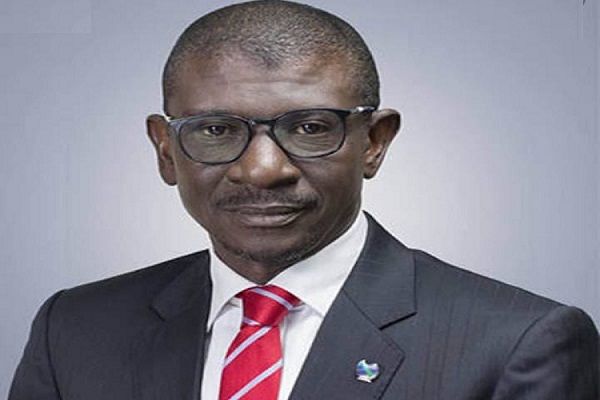
Alhaji Abba Bello was first appointed Managing Director of Nigerian Export-Import (NEXIM) Bank by former President Muhammadu Buhari in 2017 for an initial five-year term. He was reappointed in April, 2022. His retention by President Bola Tinubu is an obvious reward for his hard work, diligence, commitment, transparency, accountability and the major reforms he implemented which have returned the organization to profitability.
During Bello’s first five years, the management he led recorded very significant increases in the operating profit of the bank and significantly reduced its non-performing loans.
The operating loss of N8.030 billion inherited by the current management was reversed to N3.825 billion profit in 2021.
There was a reduction in non-performing loans from 94 per cent in 2017 to 29 per cent as at December, 2021,as well as an increase in the total assets of the bank by approximately N136.132 billion or about 222 per cent from inception of the Bello management in 2017 to 31st December, 2021.
The liquidity position of the bank was enhanced through additional funding totalling N103.755 billion from Central Bank of Nigeria (CBN), N3.936 billion from Federal Ministry of Finance, US$50 million from the Nigerian Content Development Management Board (NCDMB) and US$25 million from the African Export-Import Bank.
Under Bello’s management, NEXIM also recorded high growth in loan recoveries from N40.780 million in 2016, preceding the current management, to an annual average recovery of N1.243billion between 2017 and 2020 and a total collection of N11.903 billion for the five years.
The bank disbursed a total sum of N144 billion in loans to export-oriented entities in the non-oil sector while accounting for approximately US$375 million as export proceeds within the period under review.
Following these improvements in performance indices, NEXIM bank was ranked among the best three Development Finance Institutions (DFIs) and best five public institutions surveyed based on the Independent Corrupt Practices and Other Related Offences Commission (ICPC) Anti-corruption Assessment Criteria.”
Apart from the improvements in performance, NEXIM under Bello’s management has been innovating for its future and that of the market it serves. One of such innovations is the recent launching of a digital hub, Cocoa Connect Africa, in its bid to boost cocoa production in the country. The bank said it was being driven by a renewed thinking that would achieve the Renewed Hope target of $1 trillion economy in line with the vision and mantra of President Bola Ahmed Tinubu.
The Cocoa Connect Africa was built by NEXIM in collaboration with its long-term partner, Sapphital Limited, a leading digital company in Nigeria. Bello explained that the move was to bring the activities of stakeholders in the cocoa industry and the cocoa ecosystem under one platform. According to him: “It is about somebody who has products and meeting someone who is interested in the product. It is about connection and market information. We are putting all the stakeholders on the value chain for different commodities, but the one we launched today is for cocoa and we are also doing the same for cashew.”
“We are also doing so for Shea. The idea is to have a cluster because today everything is done digitally, why should our trade be lagging behind. We must create a platform for every stakeholder to log in to purchase what they want digitally from their comfort zones.”
He said the platform could be used to educate farmers and regulators as well as pass information on latest developments.
Other milestones recorded by NEXIM Bank under Bello was the giving of N100 billion credit support to Cocoa exporters with over N100 billion with all facilities performing, and the creation of over 7000 direct and 70,000 indirect jobs for Nigerians.
Abba Bello has over 30 years’ experience in banking, where he has held senior management positions in corporate banking, regional and commercial banking, and public sector banking in more than a decade. Abba also had a brief stint in auditing.
Until his appointment as Managing Director and Chief Executive Officer of Nigerian Export-Import Bank in April 2017, he was Executive Director, Unity Bank Plc, in charge of Corporate Banking, Agriculture and North Directorate.
Abba has cognate experience in international banking. He was the pioneer Managing Director/CEO of United Bank for Africa Plc’s subsidiaries in the Republic of Chad and Zambia for several years.
Abba has attended several courses in Nigeria and abroad in leadership, advanced management, and executive management. He is a member of Chartered Institute of Bankers Nigeria, a Fellow, Institute of Credit Administration, and a member of the Institute of Directors. He is an Alumnus of the Advanced Management Programme of the Havard Business School, USA.
ALWAN ALI HASSAN (MD, BOA)
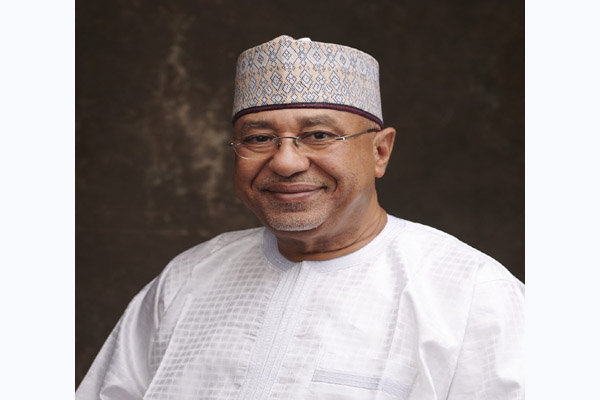
When Alwan Ali Hassan retired in 2011, he thought he was done with banking. But former President Muhammadu Buhari thought otherwise. Buhari recalled Hassan from retirement nine years after and appointed him Managing Director of Bank of Agriculture (BOA), a specialized bank set up to finance the development of the agricultural sector in Nigeria.
Buhari must have seen in Hassan the qualities required of a banker that could turn around the fortunes of the then ailing BOA. Apparently, by retaining Hassan as the Chief Executive Officer of BOA, Buhari’s successor, President Bola Tinubu, must have acknowledged not only Hassan’s outstanding bank management profile but also his performance at BOA since 2020.
Before his retirement in 2011, Hassan’s last role in banking was as the Executive Director of Bank PHB, a bank that was, literally speaking, on life support. “I was appointed by the CBN (Central Bank of Nigeria) when they took over nine banks in 2009,” Hassan said in a recent interview. “I remained in that position for two years, during which time we successfully rebranded it as Keystone Bank.”
Hassan’s experience at turning a failing Bank PHB into a successful and thriving Keystone Bank must have come in handy for him at the Bank of Agriculture. Under his leadership, BOA has become one of Africa’s most capitalized agricultural development banks, providing affordable financing to small-scale farmers and agribusinesses across the country.
He also boosted the bank’s loan recovery performance following the development of a robust framework that has helped it recover a significant portion of its outstanding loans. He set up a task force committee at the bank’s Head office which collaborated with the zonal offices and some key branches on the recovery exercise.
Some of the loans were given 20 to 30 years before the introduction of the BVN system, so their recovery was difficult. Without a BVN, people can move around, and you cannot trace them. What the BOA boss did was to get 10 BVN machines from Nigeria Interbank, and enrolled all the bank’s customers in the system. “We told them to either pay up or risk being reported to the police or CBN for sanctions. They showed up and paid,” Hassan said.
Gradually, recovery improved because of the BVN. But the bank also realised that some customers had lost their businesses due to insecurity, flooding, and drought. Those in this category were put into what is called classified assets for special management.
When Hassan assumed office as BOA Chief Executive in May 2020, the bank had a presence in 140 locations, including branches, cash centres, recovery centres, and Bank of Agriculture Rural Business Initiative (BOARBI) centres. In August that year, the bank’s shareholders approved the reduction of the branch count from 140 to 110 branches nationwide, with a caveat that there should be three branches in every state, one in every senatorial district, and two in Abuja. That makes it 110. Hassan set up a committee to implement this restructuring. The committee started merging the locations by closing the recovery centres and BOARBI centres. As at March 2023, BOA’s branch network had been reduced to 120, with only 10 more off target.
The bank’s restructuring also involved the conduct of a staff audit exercise. The essence was to determine the bank’s manpower needs in terms of numbers, skills, status, age, etc, to enable the management take decisions on appropriate deployment, promotion and so many other things. “We have done that; it has brought us so much information, which we have also presented to the shareholders for approval,” Hassan said.
All these efforts have been complemented by Hassan’s focus on strengthening customer relationships and providing tailor-made solutions to meet its customers’ unique needs.
The bank is now looking into the future with confidence, especially with shareholders having agreed to recapitalise and restructure the bank. This decision is expected to significantly benefit the bank, its customers, and its shareholders. Recapitalisation will provide the bank with much-needed funds to enhance its operations, expand its business, and improve its services. Additionally, restructuring will help the bank streamline its processes, reduce inefficiencies, and increase profitability. As a result of this decision, the bank will be better positioned to compete in the market. It will also meet its customers’ evolving needs. In addition, shareholders can expect increased investment returns and value.
“I am pleased with the outcome of this decision and confident that it will lead to a brighter future for the bank,” the BOA boss said in March last year.
Alwan Ali Hassan is a graduate of Ahmadu Bello University, Zaria, where he obtained a Bachelor’s degree in Quantity Surveying in 1980. He bagged a Master’s degree in Business Administration from his alma mater in 1987.
He is a registered member of the Chartered Institute of Bankers, Nigeria Institute of Quantity Surveyors and Quantity Surveyors Registration Board.
Hassan started his Banking career with Central Bank of Nigeria before moving to United Bank of Africa (UBA) in 1996. He was at African International Bank Limited from 1999 to 2001. Later in 2001, he joined First Bank of Nigeria and rose to the position of Deputy General Manager.
The Central Bank of Nigeria, in December 2009, appointed Hassan as Executive Director in Bank PHB Plc. as a member of the rescue team to institute sound Corporate Governance, recover bad loans and recapitalize the Bank.
The position made way for him to be a Board Member of Bank PHB subsidiaries, including Orient Bank, Uganda; Bank PHB, Gambia; and Platinum Capital & Trust Limited, Nigeria.
Until his appointment in 2020 as the Managing Director/Chief Executive Officer of BOA, Hassan was the Chairman/CEO of Midrage Universal Biz Limited, a Company he established in December 2011 after leaving the Banking Industry.
He has attended Management training at the famous IMD Business School Lausanne, Switzerland and Intrados Business School, Washington DC, USA.
BRIG. GEN. MOHAMED BUBA MARWA (CHAIRMAN/CEO, NDLEA)
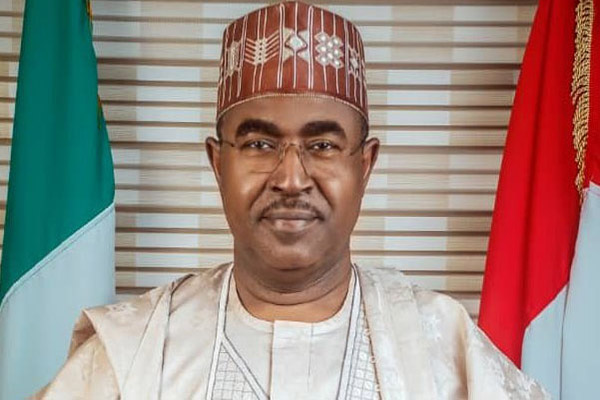
Brig.Gen. Mohamed Buba Marwa (retd), Chairman of the National Drug Law Enforcement Agency (NDLEA) has something of a Midas’ touch. He turns every position of responsibility he occupies into (not gold, but) a resounding success. From his military service duties to his days as Military Administrator of Lagos State and now as NDLEA boss, Marwa’s name has been associated with outstanding performances. It is, therefore, no surprise that President Bola Ahmed Tinubu decided to retain him as NDLEA boss amidst the gale of leadership changes taking place at Federal Government agencies since June last year.
Marwa was appointed the 11th Chairman/Chief Executive Officer of NDLEA on January 15, 2021 and assumed office three days later, hitting the ground running with the launch of Offensive Action.
His previous stint as Chairman of the Presidential Advisory Committee on the Elimination of Drug Abuse (PACEDA) (2018-2020), prepared him for the turnaround task at the NDLEA. It helped him to introduce a raft of reforms aimed at resuscitating the agency.
Like a general in battle, he has been leading the NDLEA workforce in a purpose-driven campaign against the drug underworld, a full spectrum offensive action that has seen 38 drug barons currently facing prosecution. Today, Nigeria is in a new epoch of drug law enforcement that has made the country the cynosure of the international community.
Within a short time, Marwa invigorated NDLEA with a ramped-up drug supply reduction campaign which in 10 months delivered over 10,000 arrests, 1,000 convictions and over three million kilogrammes of assorted drugs and cash seizures valued at over N120 billion. He also embarked on a strategic restructuring of the Agency to bring it up to the standards that would meet the challenges of modern drug law enforcement. These include expansion of the directorates, institution of a performance reward scheme and other career incentives and repositioning of the agency for efficiency and visibility. His efforts were rewarded with results that attracted commendations from governments of foreign countries and the agency’s strategic partners who have shown renewed trust in NDLEA in words and action. In his first year in charge, NDLEA gained international recognition as a regional force in drug law enforcement and attracted partnerships from similar agencies around the world.
At a point, an impressed former Pesident Buhari, in a statement by his Special Adviser on Media and Publicity, Femi Adesina, was quoted as telling Marwa, “You have demonstrated over and again that choosing you to lead this fight against wicked merchants of death whose sole aim is to endanger and truncate the future of our youth is a very good choice. Please keep up the good work. I deeply appreciate the work that you have put into the eradication of the drug menace. It gladdens my heart as I continue to follow the successes achieved under your leadership.”
The presidential commendation came on the heels of Marwa’s “highest cocaine seizure,” worth over 278 million dollars.
These and other imprints at NDLEA, have earned Marwa many accolades, including awards from notable media organisations. The Vanguard Newspaper honoured him with the 2022 Distinguished Public Service award while another well-deserved honour was the Public Servant of the Year Award for 2022 from Independent Newspaper.
Today, because of his effort, Nigeria is witnessing a new dawn in the drug war and his string of successes in the tough battle against drugs has projected the nation in a more positive light.
In just a few years, Marwa could be on record as the first drug czar to embrace a multi-dimensional and holistic approach and lead the agency to arrest thousands of drug offenders, including notorious barons across the country.
Born in Kaduna on September 9, 1953, Marwa, an indigene of Adamawa State, is a scion of a military family. His father, Buba Marwa, and grandfather, Buba Yola, had served in the Nigerian Army, and Marwa did not deviate from that path. He had his primary school education across Nigeria in Enugu, Zaria, Abeokuta, and Lagos (1960-65) and went on to attend the Nigerian Military School (NMS) Zaria (1966-70). Subsequently, he completed a regular combatant course at the Nigerian Defence Academy (NDA) and was commissioned into the Nigeria Army Recce Corps, NARC, in June 1973.
He had a meritorious military career where he served in many important positions across the military formation including the Brigade Major, 23 Armoured Brigade; Academic Registrar, the Nigerian Defence Academy; Deputy Defence Adviser, Nigerian Embassy, Washington DC; and Defence Adviser, Nigerian Permanent Mission to the United Nations, New York.
He was at first Military Governor of Borno State (1990-1992) and later Military Administrator of Lagos State (1996-1999), where he earned a reputation as a turnaround manager and management guru.
After retirement, Marwa who has Masters in Public and International Affairs (University of Pittsburgh, 1985) and Public Administration (Harvard, 1986), also served as Nigeria’s ambassador to South Africa, Lesotho and Swaziland.
DR. VINCENT ISEGBE, (DIRECTOR-GENERAL, NAQS)
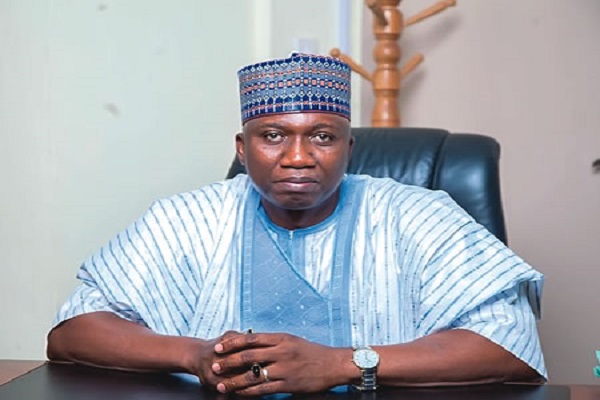
The circumstances under which Dr. Vincent Isegbe was reappointed as the Director-General (D-G) of the National Agricultural Quarantine Service (NAQS) is, perhaps, the best and latest proof that President Bola Ahmed Tinubu is a stickler for merit in making appointments.
Dr. Isegbe’s first 5-year tenure in that office had expired in December 2023 and an acting C-G had taken over control of affairs of NAQS. But before a substantive successor was named for the agency, a report was released by the Presidential Enabling Business Environment Council (PEBEC) which ranked NAQS in the top three agencies of the Federal Government of Nigeria in the efficiency and transparency index. An impressed President Tinubu did not hesitate to return Dr. Isegbe to NAQS to continue with his good work.
“The President expects that the Director-General will build on the Service’s recent performance after it ranked in the top three agencies of the Federal Government of Nigeria in the efficiency and transparency index by the Presidential Enabling Business Environment Council (PEBEC),” Ajuri Ngelale, the Presidential spokesman, said in the statement on Thursday, March 7, announcing Isegbe’s reappointment.
NAQS was established by the Nigeria Agricultural Quarantine Service (Establishment) Act 2018 as a full-fledged agency of government to promote and regulate sanitary and phytosanitary measures with respect to the export and import of plants, veterinary and aquatic resources.
The mandate of the Service is to ensure the conformance of Nigerian agricultural products to international standards –particularly, the requirements of the International Plant Protection Convention (IPPC) and the International Office of Epizootics –and to stimulate international trade in Nigerian agricultural products.
Former President Muhammadu Buhari appointed Dr. Isegbe as the pioneer Director-General of NAQS with effect from 13th December 2018 for an initial period of five years. He was charged with the responsibility of “institutionalizing the administrative and management structures requisite for operationalizing the paramilitary status of the agency.”
Isegbe hit the ground running. He led the Service to implement several key projects that have contributed significantly towards improving both production and exportation of agricultural commodities in the last five years. For instance, the agency introduced Biopesticide and integrated pest management programmes, the review of Biopesticide laws and regulations and the training of stakeholders on proper usage of Biopesticides.
The agency developed and enhanced 28 Export Certification Value Chains (ECVC) manuals for improved export and stakeholder awareness. It introduced management control measures to support farmers in the control and management of MLND and CBSD pest outbreaks. The Tuta Absoluta management and control programme in tomatoes, garden egg, etc, including the training of farmers on how to manage and control Tuta Absoluta on the vulnerable varieties, was also introduced.
Other innovations include the breeding/ranching programme for sustainable donkey hide export in which over 120 dealers on donkey ranching were trained; the development of animal disease-free areas and farms; the development and improvement of ornamental fish seedlings for export trade; analysis of Mycotoxins and heavy metals contaminants in animal products for export to enhance the confidence of trading partners and importing countries; and the BBTV control programme to support farmers in the control and management of Banana Bunchy Top Disease virus.
NAQS also embarked on awareness and sensitization campaign activities, including jingles in mainstream and new media, printing of posters/pamphlets in English, Pidgin and other local languages to further spread and enhance awareness and activities of the agency.
The agency embarked on Nationwide zero-reject advocacy to reduce the number of commodities being rejected at borders/states when exported; fruits and vegetable inspection and certification programme to enhance officers’ capacity for conformity assessment for export; establishment of SPS protocol for ECOWAS, EU, UK, US and Asian markets to enhance exportability of Nigerian agricultural commodities; awareness programme on the quarantine perspective of good agricultural practices; Army worm management and control programme in maize, sorghum, millet, etc; inspection, monitoring and certification of fish farms, facilities, water bodies, etc, to enhance the exportability of Nigerian aquatic products; and analysis of drug residues in animal products for export to enhance the confidence of trading partners and importing countries.
Projects executed in the area of construction, works and procurements include the architectural design of the proposed 6-storey NAQS Headquarters complex building, staff quarters, clinic, recreational facilities and demonstration farms.
The agency also equipped and renovated the Ibadan Training School conference hall with 100-seater state of-the-art auditorium and other facilities including the provision of 50KVA generators.
Other projects are the construction of two-storey laboratory building at Abuja and Lagos to facilitate the fulfillment of the agency’s mandate of inspection and certification; provision of Laboratory standards for Gas Chromatography at Ibadan Diagnostic Centre to enhance the research capabilities of the organization on methods to combat, control and prevent the spread of whitefly and other pests and disease incursions into Nigeria; office redesign and provision of sleek work stations and office equipment for efficient service delivery; and the construction of students hostels at the Ibadan Diagnostic Centre/Training School. These facilities were constructed to house officers of the quarantine service during training and other research functions.
Also executed were the construction of four units of one-bedroom building each at Idiroko, Calabar, Mfum and Imeko stations to provide office accommodation for quarantine operations at the various Control Posts; fencing of Illela, Lokoja, Maigatari, Makurdi and Idiroko Control Posts and construction of gate houses to further secure the assets of the agency; purchase of 24 Hilux vehicles and 10 Toyota Corolla vehicles for operational purposes at the zonal commands and headquarters; provision of equipment for linking NAQS with Nigeria Customs integrated information system to enhance trade facilitation activities and to support the ease of doing business programme of the government; provision of microchips for electronic identification of animals at ports and borders as well as the calibration instrumentation and training of officers.
Dr. Isegbe also equipped NAQS laboratory in Lagos and trained laboratory personnel in pursuit of ISO 17025 certification; developed and equipped Veterinary Quarantine stations at Illela and Makurdi to ensure effective and efficient sanitary inspection of animal and animal products at the inter-state control posts; and renovated Green/Screen houses in Ibadan Diagnostic Centre to meet the modern day demands of scientific accuracy and research precision.
The NAQS D-G also embarked on massive staff development, involving the training of quarantine officers on ACFTA and other export trade policy matters at the Trade Policy Training Centre in Africa (TRAPCA), Arusha, Tanzania; training of officers on laboratory management procedures in UK; and the training and retraining of officers on global SPS standards in Geneva.
He also ensured that IPPC/OIC/CODEX Meetings/Trade facilitation trainings were carried out to promote trade facilitation activities with trading partners and organizations; officers were involved in Cochran Fellowship training in the USA; NAQS officers were sent to the trade promotion programme for developing countries in Beijing China; and officers were sponsored for scholarship in postgraduate programme in University of Tsukuba, Japan.
Other activities of NAQS under Isegbe’s leadership are: the migration of staff from federal civil service commission to the NAOS paramilitary structure; engendering of the first NAQS promotion/Rank adjustment of 27 mid-level to senior officers; brokering of Phytosanitary protocol with the Chinese government for the establishment of sorghum farms for the export of sorghum to China; and the signing of a workplan with Mexico, sealing a deal for the export of millions of dollars worth of hibiscus export to Mexico and the Americas.
NAQS, under Isegbe’s leadership, hosted the World Congress of Regional Plant Protection Officers in Nigeria at Sheraton Hotel and Towers, Abuja, in 2019. It was the first by a National Plant Protection Organization (NAQS) in Africa.
As the Chief Executive Officer of NAQS, Dr. Isegbe has been churning out policies and programmes that make the Service stand out in the comity of sister agencies and international counterparts. He surely knows how to dig out the hidden treasures in NAQS’ human and material resources in such a way that it remains the agency to beat. He introduced the Service’s Annual Summit and Management Retreat where issues aimed at seeking better ways for effective and efficient service delivery in the agricultural value chain are discussed. The fourth edition took place in 2023.
It is little wonder that NAQS has been carting home awards and receiving accolades from within and outside Nigeria. It won the “Most Innovative Government Agency” award, by BusinessDay Media Ltd, for several crop surveys, the conduct of Pest Risk Analysis, amongst others; won 2nd position award for Outstanding Contributions to Nigeria’s Agricultural sector by National Agriculture Foundation of Nigeria during the World Food Day 2019 Agric Show; won the PEBEC 2018 Award-Most Improved Agency, second position on Transparency and Efficiency; and was voted the Most Improved Agency in the 5TH PEBEC Award, April 2023.
Dr. Isegebe earned his Doctor of Veterinary Medicine degree at Ahmadu Bello University, Zaria, in 1985 and his Master’s degree at the University of Maiduguri in 1990. Over the years, he has also undergone several training and courses within Nigeria and overseas. He is putting finishing touches to his PhD in International Agribusiness at Lead City University.
He began his career as a veterinary officer in the Federal Department of Livestock, Federal Ministry of Agriculture and Rural Development in 1989 and rose through the ranks to the position of Assistant Director before joining the NAQS as one of its pioneer staff in 2008. He was appointed NAQS pioneer Comptroller-General 10 years later following the signing into law of the Nigeria Agricultural Quarantine Service (Establishment) Bill 2018 which transformed the department into a full-fledged paramilitary agency.
MOHAMMED SHEHU (CHAIRMAN, RMAFC)
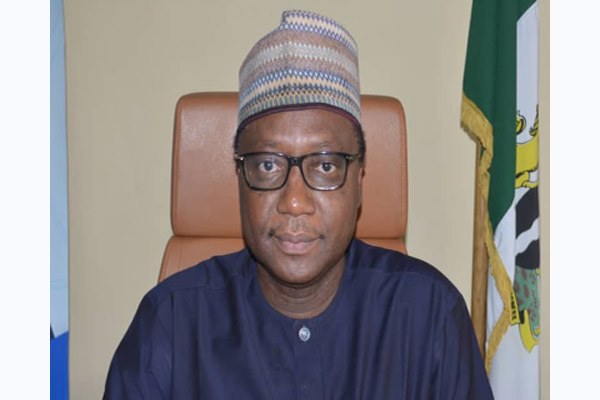
Mohammed Bello Shehu was appointed by former President Muhammadu Buhari in 2022 as the Chairman of the Revenue Mobilisation Allocation and Fiscal Commission (RMAFC).
Bello succeeded Elias Mba who had left the Commission after serving as its Chairman for two terms spanning ten years. Bello’s retention by President Bola Ahmed Tinubu is an acknowledgement of his satisfactory performance so far in his first two years as Chairman.
RMAFC was established by Decree No. 49 of 1989 and later amended by Decree 98 of 1993 (now RMAFC Act CAP R7 LFN 2004) under Section 153(1) of the 1999 Constitution of the Federal Republic of Nigeria (As Amended).The Commission is listed as one of the 14 Federal Executive Bodies. It has a Chairman and Members from each State of the Federation and the Federal Capital Territory appointed by the President.
The responsibility of the commission includes monitoring and mobilization of revenues to the Federation Account, disbursement, as well as fixing and reviewing of the salaries of political, public and judicial office holders.
Shortly after his inauguration as Chairman, Shehu assured that the commission would assist the Federal Government to get more revenue, block leakages, implement the constitutional responsibility of the commission.
Bello said: “The task is challenging. We all know the situation that Nigeria is, or even globally when you look at contemporary African countries like South Africa, Ethiopia, Ghana, and Egypt, and all the economic issues that are facing including Nigeria.
“We had the COVID-19, we had a recession, we now have the war with Ukraine, which has affected many countries and revenues are down all over.
Bello said his administration would focus on how it can get more revenue for Mr President. He acknowledged the fact that there has been a debate on whether there was an operating surplus by agencies of government. Some agencies of government claim that what they are getting is a surplus of revenue.
“Revenue is revenue as far as the commission is concerned,” Bello said, stating that “my task is to get our members to respond to the task that Mr President gave them… That is what we are going to do with all the stakeholders Federal Inland Revenue Service (FIRS) and Nigerian National Petroleum Company Limited (NNPCL), the Federal Ministry of Finance, every revenue generating agency, we have to collaborate and corroborate to be able to assist Mr. President to get more revenue before he leaves office. This is a task that should be done by every meaningful member of the commission…”And also, we will maintain our independence like it had been enshrined in the constitution.”
Since then, he has been working silently but doggedly to fulfill the mandate of the Commission. He has, for instance, started the process for the review of the remuneration for Political, Public and Judicial office holders in the country. He disclosed this during a courtesy visit to the former Chairman, Nigerian Governors Forum, Aminu Tambuwal in Abuja. According him, the last time the review was carried out was 2008 which makes the exercise to be long over due. The exercise is expected to cover political office holders from the President down to Local Government councillors.
The proposed review of salaries and allowances of political, public and judicial officers in Nigeria is meant to address the growing agitations from the political class. The salary review has been necessitated by the rising cost of living and the need to discourage corrupt tendencies by public and political office holders whose positions are tenured. It is also redress the situation whereby some political appointees earn more than the country’s President.
Shehu is also said to be working on the introduction of a new revenue allocation formula that will replace the existing outdated formula being deployed to share Federation Account revenue to governments at all levels. The nation’s revenue allocation formula has not been reviewed for about 29 years even though Nigeria’s constitution prescribes a five-year review period for the formula.
Under his leadership the RMAFC has introduced a software that would help in data collection for review of horizontal revenue allocation formula amongst states and amongst Local Government Councils. To achieve this, RMAFC has embarked on training of government officials of states and local governments, including area councils of the Federal Capital Territory, to equip them with in-depth understanding of and operations of the electronic platform that the Commission would use in data collection as it prepares to review the proxies for the Horizontal Revenue Allocation Formula for the nation. The software is to enhance the collection of data on the indices to be used for the horizontal Revenue Allocation Formula for the nation.
In a statement, “the RMAFC Chairman stated that pursuant to its mandate to review the indices used for the Horizontal Revenue Allocation Formula from time to time in line with the changing realities, the Commission is deploying the latest information technology tools to minimize human interface in data collection, thereby promoting objectivity, transparency, justice and equity in revenue allocation.”
DR. BASHIR YUSUF JAMOH (EX-DG/CEO, NIMASA)
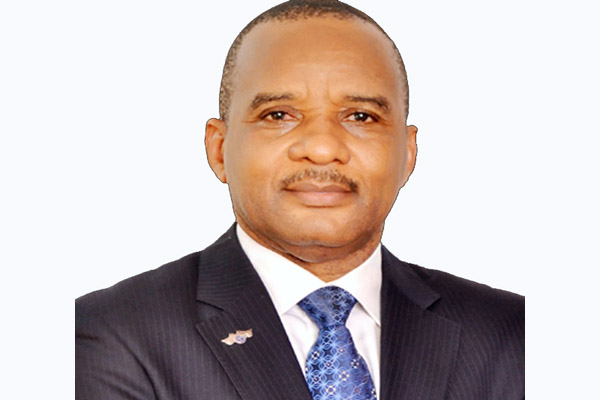
Unlike many of his contemporaries who got their tenure truncated, Dr. Bashir Jamoh was allowed by President Bola Tinubu to serve out his four year tenure successfully. He only handed over the mantle of leadership of the agency few days ago to the director of Finance and administration, Dr. Chudi Offodile in an acting capacity after the expiration of his first tenure. As at the time of going to press, no official statement yet concerning his fate or about appointment of a substantive successor.
One of the innovations President Bola Tinubu brought into his government was the creation of the Ministry of Marine and Blue Economy. Many reached for their dictionaries to know what blue economy meant. But the President knew what he wanted and the professionals he needed to drive the new ministry.
The President’s personnel plans began to manifest during the reconstitution of the management teams of the four agencies which form the backbone of the Marine and Blue Economy Ministry. They are the Nigerian Maritime Administration and Safety Agency (NIMASA), Nigerian Shippers’ Council (NSC), Nigerian Ports Authority (NPA), and the National Inland Waterways Agency (NIWA). Of these, President Tinubu reappointed the Chief Executive Officers of NIMASA and NPA, the two agencies headed at the time by core professionals in the maritime sector, in order to avail the new ministry of their expertise and experience.
Dr. Bashir Yusuf Jamoh, the then Director General of NIMASA and President, Chartered Institute of Transport Administrators (CIoTA), is, unarguably, one of the longest serving managers and administrators in the Nigerian maritime sector. He has over 37 years of professional and technocratic experience in the transportation and maritime sectors of the Nigerian economy. He was first appointed Director-General/Chief Executive Officer of NIMASA on March 10, 2020 after serving in various management cadres and positions in the agency, the National Maritime Authority (which later transformed into NIMASA), and other transport and logistics companies.
Under Jamoh’s leadership, NIMASA has recorded major and groundbreaking achievements. Some of them include the restructuring, reformation and repositioning of the agency; improvement of revenue generation and steady remittance to the Consolidated Revenue Fund (CRF) of the Federal Government; successfully hosting the 3rd Association of African Maritime Administrations (AAMA), 2017; training of over 1,650 personnel locally and internationally in diverse subjects and skills; and establishing, equipping and managing NIMASA’s ultra-modern training centre with capacity to accommodate 200 participants at a time.
Others are: successfully planning, managing and appraising capacity development of the largest maritime organisation for about a decade; improving and aligning the agency’s training to world-class standard; budgetary management of over N117 billion with commensurate value for every Naira spent; accidents and incidents-free management of the agency’s protocol and logistics portfolio for local and international operations; efficient research and data management for actionable maritime planning and administration in collaboration with vessel/cargo related MDAs; effective co-ordination of revenue generation from operations with a monthly budget of up to $40 million; and effectively managing the operations of incoming and outgoing vessels in major ports across coastal Nigeria.
Under Jamoh’s leadership of NIMASA, Nigeria has ratified six international maritime conventions which spell out proper modes of governance for various areas, such as standards of training, certification and watchkeeping for the fishing sector, pollution management and carriage of passenger luggage by sea.
Within Jamoh’s first three years as DG/CEO, NIMASA had concluded the review of 49 Regulations made pursuant to the Merchant Shipping Act 2007. Laws in this category specifically sought to protect the interests of indigenous professionals and investors in the maritime industry with first-choice opportunity preferences. It also bridged operational gaps between the maritime sector and other areas while fostering inter-agency collaboration with other federal government-owned organisations.
Jamoh and his team also succeeded in Executing some Memorandum of Understanding (MoU) between the agency and Nigerian Meteorological Agency (NiMet), the Nigerian Institute of Transport Technology (NITT) and the National Oil Spill Detection and Response Agency (NOSDRA), amongst others. Other MoUs reached include the one on the recognition of Certificate of Competency (CoC) and Training of Seafarers between Nigeria and 16 countries. It was aimed at expanding opportunities for international level job placement for holders of Nigeria CoC while also causing Nigerian skilled maritime manpower deployment in addressing the global challenge of a declined number of seafarers.
NIMASA also achieved the automation of the registration process of Shipping Company/Agents resulting in Certificates being embedded with QR Codes for authentication. This has successfully eliminated the back-and-forth incidents of alleged fake certificates in the past and has enthroned a greater level of integrity and accountability in the certification process.
NIMASA, under Jamoh, made deliberate drive to educate and strengthen judicial officers on how best to handle admiralty cases. The agency successfully hosted the Annual Nigerian Admiralty Law Colloquium in collaboration with the Nigeria Institute of Advanced Legal Studies (NIALS) and the National Judicial Institute (NJI) for the years 2021, 2022, and 2023. It also championed the implementation of the Suppression of Piracy and Maritime Offences (SPOMO) Act, 2019, which has enhanced safer and secured trading routes through the Gulf of Guinea region and ensured proper prosecution of a sizeable number of cases such as FGN v Binaebi Johnson & 8 Ors and FGN v Frank Abaka & 9 Ors.
Other maritime administrations are presently studying this landmark SPOMO Act by Nigeria owing to its huge success in fighting piracy with a rich legal framework that has been marked with successes since implementation began. In general, the Jamoh-led management of NIMASA has doubled Nigeria’s momentum for a viable blue economy that seeks to harness maritime potentials for economic sustainability and growth.
These accomplishments earned NIMASA and Jamoh Presidential recognition through separate awards given by the Bureau of Public Service Reforms (BPSR). While NIMASA was awarded the Best MDA in Digital Transformation, Jamoh was personally honoured with the Distinguished Trailblazers Award for Exemplary Leadership. There are many honours and recognitions both have been accorded since Jamoh became DG/CEO of NIMASA.
Announcing the reappointment of Jamoh as DG/CEO and Chudi Offodile as Executive Director, Finance and Administration, as well as other new NIMASA management team members, Ajuri Ngalele, the Presidential Media Aide, expressed Tinubu’s firm belief that they would expeditiously and efficiently execute their collective mandate to create the conditions required to significantly raise the contribution of the Marine and Blue Economy sector of the country’s Gross Domestic Product, GDP.
Jamoh holds a Ph.D. from the University of Port Harcourt, specializing in Logistics and Transport Management. He also holds a Master’s Degree in Management from Korea Maritime and Ocean University; Post Graduate Diploma in Management Sciences from Bayero University, Kano; and a Diploma in Accounting from Ahmadu Bello University Zaria, respectively. He has attended several leadership and management courses at the Harvard University, US; Oxford University UK, Cambridge University, UK; International Training Centre of ILO, Turin, Italy; Institute of Public Private Partnership, Washington DC,; International Law Institute, USA; and Institute for Leadership and Development for the Public Good, USA; Royal Institute of Public Administration, UK; and World Maritime University, Sweden; amongst others. He is also the author of the book, ‘Harnessing Nigeria’s Maritime Assets – Past, Present and Future.’
The DG/CEO of NIMASA began his working career in May 1987 as Accountant, Produce Purchase, Farmers Supply Company (KDS) Ltd, Kaduna. After two promotions to the positions of Assistant Produce Purchase Manager, and Principal Procurement Officer, he left the company in December 1993 to join the National Maritime Authority (NMA) as Principal Commercial Officer, Operations (Dry/Wet cargo) in January 1994.
Following the transformation of NMA into NIMASA, Jamoh became the Assistant Chief Commercial Officer, Eastern & Central Zones, of the restructured and rebranded agency. Between NMA and NIMASA, Jamoh held 10 different management positions, including Executive Director (Finance & Administration) from where he was made the DG/CEO NIMASA in 2020.
SALIHU ABDULHAMID DEMBOS (DG, NTA)
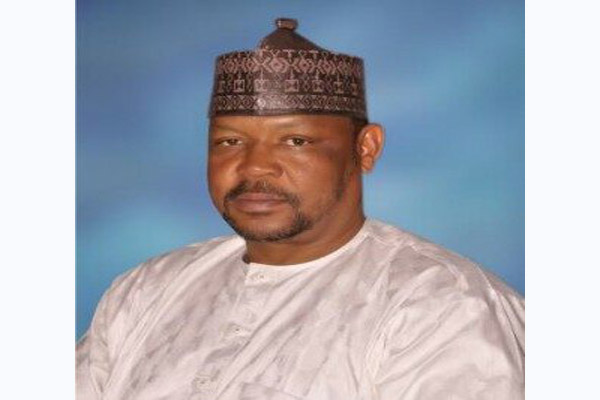
On October 19, 2023, president Bola Ahmed Tinubu announced the appointment of eight new Chief Executive Officers for Parastatals and Agencies under the Federal Ministry of Information and National Orientation with immediate effect.
The parastatals and agencies included the National Orientation Agency, the Nigerian Television Authority, the Federal Radio Corporation of Nigeria, National Broadcasting Commission, Voice of Nigeria, Advertising Regulatory Council of Nigeria, News Agency of Nigeria and the Nigerian Press Council.
The President tasked the new helmsmen to “innovate and create new opportunities for Nigerians to leverage upon through the effective reform of these key institutions of government which function” to unify Nigerians, reshape mindsets, and showcase the nation to the rest of the world.
Out of the eight CEOs, Salihu Abdulhamid Dembos, the Director General of the Nigerian Television Authority (NTA) was the only incumbent that was reappointed. Dembos’ reappointment to the helm of NTA reflects his extensive experience, dedication to the field, and proven leadership abilities.
He was first appointed to the office by former President Muhammadu Buhari earlier in September 2022 for an initial three-year term. His reappointment by Tinubu is seen as a stamp of approval of his satisfactory performance so far.
In spite of the challenges faced by NTA, the organization, under the leadership of Dembos has recorded significant achievements. Some of them include the implementation of modern management techniques and technology to improve workflow and enhancement, staff training, and development of programmes.
Others are the upgrading of broadcasting equipment and technology for higher signal quality, the network of reporters and correspondents with the establishment of Bureaus in the UK, USA, Egypt, Kenya, Ghana, and South Africa. The station, under Dembos, has also leveraged social media and online platforms for real-time news dissemination.
Salihu Abdulhamid Dembos, born on August 27, 1960, hails from Yola South Local Government Area in Adamawa state, Nigeria. He brought to NTA a wealth of experience and a deep-rooted connection to the world of broadcasting and media. Before his appointment as the Director-General of NTA, Dembos had served as the Executive Director, Marketing, at the same organization.
His journey in the field of broadcasting has been marked by dedication, commitment, and leadership. Notably, Dembos actively participated in the Staff Union, Radio Television, Theatre and Arts Workers Union (RATTAWU), where he steadily ascended the ranks to eventually become the National President from 1998 to 2007. With a career spanning over two decades as a media practitioner, Dembos held significant positions such as General Manager of two NTA stations located in Lokoja and Kano. His contribution to the broadcasting sector extends to his role as Zonal Director at NTA, Kaduna, along with several other notable appointments.




